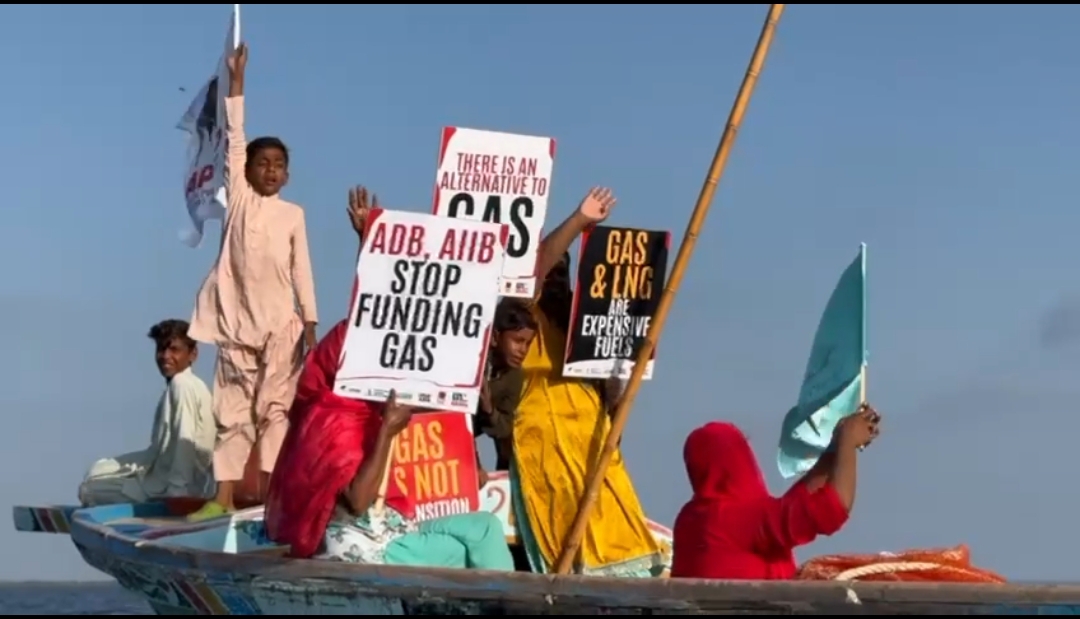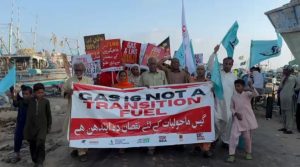Business
Boat Protests Demand Halt to Fossil Gas Expansion as COP29 Approaches


Fisherfolk rally against fossil gas expansion from Jamot Jetty in Karachi, urging world leaders to prioritize renewable energy and climate justice ahead of COP29.
Karachi, October 7, 2024: Hundreds of fisherfolk, both women and men, took part in a dramatic boat protest on Thursday, November 7, sailing from Jamot Jetty in Ibrahim Hydri as part of the “Global Days of Action Against Gas Expansion” in the lead-up to the 2024 UN Climate Change Conference (COP29) in Baku, Azerbaijan.
The boat protests, held in coastal regions of Pakistan, India, Bangladesh, Indonesia, and the Philippines, were organized by the Asian People’s Movement for Debt and Development (APMDD). The demonstrations sought to send a strong message to world leaders attending COP29 regarding the dangers posed to communities and the planet by massive investments in fossil gas.
Saeed Baloch, General Secretary of Pakistan Fisherfolk Forum, stated: “We from the Global South are united in making this call ahead of COP29. Continued investments in fossil gas endanger both people and the planet, which is in direct contradiction to the pledge made by governments at COP28 to transition away from fossil fuels. World leaders must not ignore the undeniable health, environmental, and social impacts of fossil gas, and must honor their commitments to decarbonize, deliver climate finance, and invest in renewable energy that serves humanity.”
The protest, which featured small, artisanal fishing boats—a representation of the traditional livelihoods of the fishing communities—was set against the backdrop of large gas plants and liquefied natural gas (LNG) facilities, highlighting the contrast between fossil fuel infrastructure and the future of renewable energy.
Baloch added: “It’s alarming that wealthy nations and large transnational banks continue to finance fossil gas expansion in Asia, Africa, and Latin America. We reject the dependence on fossil fuels and demand real, accountable commitments from these powers to directly support the transition to renewable energy systems. Every dollar spent on fossil gas should instead be invested in solar and wind energy—renewables that can meet our energy needs without leading us into ecological collapse. Gas is not a bridge fuel; it is a future disaster.”
Qazi Khezer, Vice Chairperson of the Human Rights Commission of Pakistan, also spoke out against fossil gas expansion, emphasizing the severe health risks posed to communities. “Fossil gas expansion is a grave health risk and an environmental threat,” Khezer said. “It causes respiratory and cardiovascular diseases, particularly in children and the elderly. Choosing gas is choosing a future where no one breathes clean air.”Fatima Majeed, Senior Vice Chairperson of Pakistan Fisherfolk Forum, emphasized the global ramifications of continued fossil gas investments. “Fossil gas expansion in Asia undermines the global climate goals and makes it nearly impossible to achieve the 1.5°C target of the Paris Agreement. The people of Pakistan are already facing the deadly impacts of the climate crisis, including displacement and health risks. If this continues, future generations will bear an unbearable cost,” she warned.
Protesters held placards bearing messages such as “Don’t Gas Asia,” “End Fossil Fuels,” and “Gas Is Not a Transition Fuel—Shift Directly to RE,” advocating for the following demands:
A moratorium on new fossil fuel projects, including new public and private finance, approvals, licenses, permits, or extensions.
A rapid, just, and equitable phase-out of existing fossil fuel infrastructure in line with the 1.5°C temperature limit, and a global plan to ensure that each country contributes its fair share.
Increased international cooperation to scale up climate finance and technology transfers, ensuring renewable energy access and supporting Just Transition processes.
An end to greenwashing and false solutions like carbon offsets, CCS, or geoengineering.
Holding polluters accountable for the damage they have caused and ensuring that coal, oil, and gas corporations pay reparations for climate loss, damage, and local rehabilitation.
Ending corporate capture of climate action processes and preventing corporations from writing the rules of climate policy or undermining global climate efforts.
Business
A billion laser points helped bring Notre Dame back to life

After a catastrophic fire five years ago, the Notre Dame Cathedral de Paris reopened this month looking almost the same as it did when it was first constructed in 1163.
The massive reconstruction project was a testament not just to the hard work of the French people – but also to the lasers, drones and other advanced technology that gave rebuilders a window into the building’s past.
“The time frame wouldn’t have been possible without the record of what existed,” Amy Bunszel, executive vice president of architecture, engineering and construction at 3D-software company Autodesk, told CNN. Her company was a major part of creating a model of the building as it existed before the fire, giving the reconstruction effort a sort of guide for what to do. “It would’ve required a lot more guesswork. Imagine taking millions of tourist photographs (as a reference point) versus having one consolidated perfect representation.”
Business
Inflation was the cause, not the result, of the ‘hot’ labor market, research shows

Back in 2022, when the labor market was so hot that Beyoncé even released a song about it, Americans were job hopping in large numbers, boosting their salary in the process.
The Great Resignation was in full swing.
That fueled fears of a “wage-price spiral” — where wages and prices perpetually rise and feed off each other.
But what appeared to be a hot job market was actually a symptom — not the cause — of the recent bout of inflation, according to new research that explored the consequences of unexpected rising prices on the labor market.
Business
The Container Store files for bankruptcy

The Container Store has filed for bankruptcy. It is the latest well-known retailer to fall victim to customers cutting back on discretionary spending.
The 46-year-old company said in a statement late Sunday that filing for Chapter 11 bankruptcy protection will help it “bolster its financial position, fuel growth initiatives, and drive enhanced long-term profitability.” The Container Store revealed in court documents that it has about $230 million in debt and just $11.8 million in cash on hand, but will receive $40 million in fresh financing.
The chain’s 102 locations and website will remain open for orders during the process, which is expected to take 35 days to complete.
“The Container Store is here to stay,” said CEO Satish Malhotra in a statement. “Our strategy is sound, and we believe the steps we are taking today will allow us to continue to advance our business, deepen customer relationships, expand our reach, and strengthen our capabilities.”
Payments to vendors and suppliers will be made as normal and all customer deposits and orders will be honored and delivered, the company said. The Container Store plans to emerge as a private company when the Chapter 11 process is complete.
The company’s Sweden-based Elfa brand, described as a “premium customizable storage system,” isn’t included in the bankruptcy.
The filing comes a few weeks after a deal with Beyond, the parent company of Bed Bath & Beyond and Overstock.com. The Container Store was expected bring Bed Bath & Beyond-branded products to some stores, but that deal appears to be in jeopardy. Beyond previously said that the financing deal was in doubt because the Container Store was struggling to reach an agreement with its lenders.
The Container Store’s stock has already been delisted by the New York Stock Exchange because it failed to meet the exchange’s financial standards.
-

 Entertainment4 months ago
Entertainment4 months agoEarthquake scientists are learning warning signs of ‘The Big One.’ When should they tell the public?
-

 International4 months ago
International4 months agoTarar accuses Imran Khan of conspiring with Faiz Hameed to destabilise Pakistan
-

 International2 months ago
International2 months agoPTI Announces Not to Boycott New Committees
-

 Business3 months ago
Business3 months agoMajor Corruption Scandal Uncovered at WASA Multan: Rs1.5 Billion Embezzlement Exposed
-

 Business4 months ago
Business4 months agoThe Impact of QR Codes on Traditional Advertising
-

 Business4 months ago
Business4 months agoThe Benefits and Problems of International Trade in the Context of Global Crisis
-

 Business4 months ago
Business4 months agoFraud by Pakistani Firm Sparks Outrage in Business Community; Concerns Rise Over International Investment
-

 Business2 months ago
Business2 months agoHigh Court Blocks MDCAT Merit List Amid Controversy Over Exam Error






